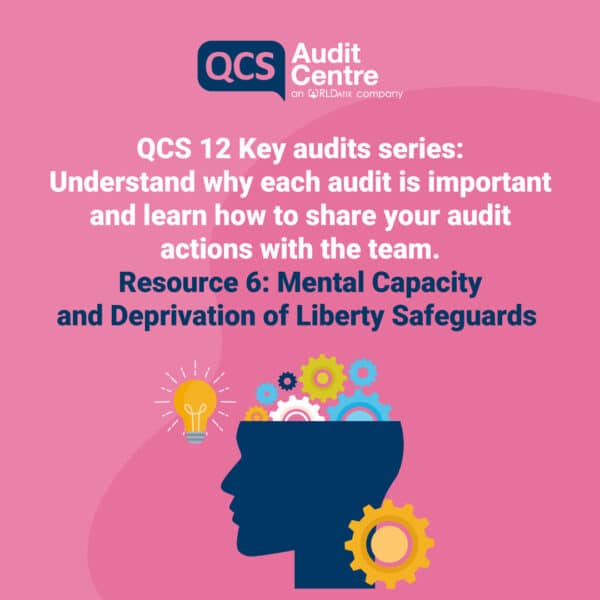Why do we need to complete audits?
To achieve good governance in your service, you must demonstrate continuous quality improvement. To do this, auditing and documenting the effectiveness of the processes and systems you have in place, and taking time to observe and document how people experience your service, is essential.
Audits and completed action plans offer evidence of the great care you provide. Where improvements are needed, they allow you to clearly and openly demonstrate how you plan to make the changes required that you have identified.
The Mental Capacity Act and Deprivation of Liberty Safeguards
The Mental Capacity Act (MCA) and the Deprivation of Liberty Safeguards (DoLS) are legislative frameworks that protect individuals who lack decision-making capacity and ensure their best interests are upheld. With news that the Liberty Protection Safeguards has been delayed, it is important to consider how auditing MCA/DoLS can improve compliance and safeguard individuals.
The Case for Auditing Mental Capacity Act and Deprivation of Liberty Records
Providers have a responsibility to operate services in line with the MCA, DoLS, and associated regulations. Auditing plays a key role identifying non-compliance, ensuring quality assurance and promoting continuous improvement.
Audits can verify that requirements are met and services adhere to legal frameworks and obligations. For example, with individuals supported at home, local authorities may make a DoLS application to the court of protection whereas in residential services, the manager leads the application process.
Audits provide assurance around appropriate referrals, timely care/support plans, and notifications to regulatory bodies which reduces the risk of legal action and safeguards the dignity and safety of individuals.
A good process captures individuals’ consent and involvement with making informed decisions, using accessible tools and communication methods such as:
- Easy read formats
- Signs, symbols and objects
- Assistive technology
- Interpreters
Auditing highlights individuals who require capacity and best interest assessments and ensures that these have been undertaken. By reviewing records, audits can identify gaps in training, inadequate assessments or improper use of deprivation of liberty, enabling corrective measures to be implemented.
Care and support plans reviewed through auditing identify any attached conditions to a DoLS approval and monitors progress in meeting these conditions. Discussion and observation can also highlight staff and managers’ understanding of the process and the difference between restrictions versus deprivations (such as locked doors, physical and chemical restraints), ensuring proper legal documentation is in place.
Auditing can assess the effectiveness of restrictive practices and interventions, ensuring they are legal and have restraint reduction plans in place.
They can also highlight collaborations with other providers and clinicians as part of an agreed multidisciplinary team (MDT) process.
Mental Capacity Act and Deprivation of Liberty: Achieving compliance
Audits enable you to provide valid, up-to-date evidence to the CQC that you are managing the Mental Capacity Act and Deprivation of Liberty process effectively and meeting the required regulations, such as:
- Regulation 9: Person-centred care
- Regulation 11: Need for consent
- Regulation 12: Safe care and treatment
- Regulation 13: Safeguarding service users from abuse and improper treatment
- Regulation 17: Good governance
Findings: What does the Mental Capacity Act and Deprivation of Liberty audit tell you?
Example 1:
An audit in a residential care home showed a lack of knowledge and general compliance with MCA and DoLS. Action:
- Review MCA/DoLS Policies and Procedures to make it clear for staff to understand
- Review those with MCA/DoLS in place to identify any conditions in place
- Ensure Lasting Power of Attorney details are recorded, and copies of certificates on file
- Ensure ALL notifications have been submitted, even if a DoLS has been declined
- Provide further training/support to staff members to increase knowledge around capacity and consent
Example 2:
An audit in a supported living service showed paternalistic practices and restrictions in place. Action:
- Provide further training/support to staff members increase knowledge around restrictions vs deprivations
- Review individuals’ participation in care and support planning with a focus on informed consent
- Review any physical intervention logs ensuring where these have met thresholds for MCA/DoLS, appropriate actions have been taken
- Review organisational policies around restrictive practice such as locked doors restricted access, even for those with capacity
- Refresh staff with the MCA 5 principles especially principle 3 (The right to make unwise decisions)
It is not just about what the audit finds that is important, but the actions you take as a provider to resolve the issues identified.
So, what happens next?
Effective auditing supports providers’ good governance, quality assurance, and continuous improvement processes. By gaining a better understanding of the MCA and DoLS through auditing, providers can enhance training, policies, and procedures, ultimately benefiting the wellbeing of those under their care and support.
Once you have had chance to review your audits, you can then if needed:
- Allocate resources
- Implement prevention measures
- Increase, implement or refresh staff training
- Consider environmental changes
- Consider the use of assistive devices
- Share the findings and actions with the team




